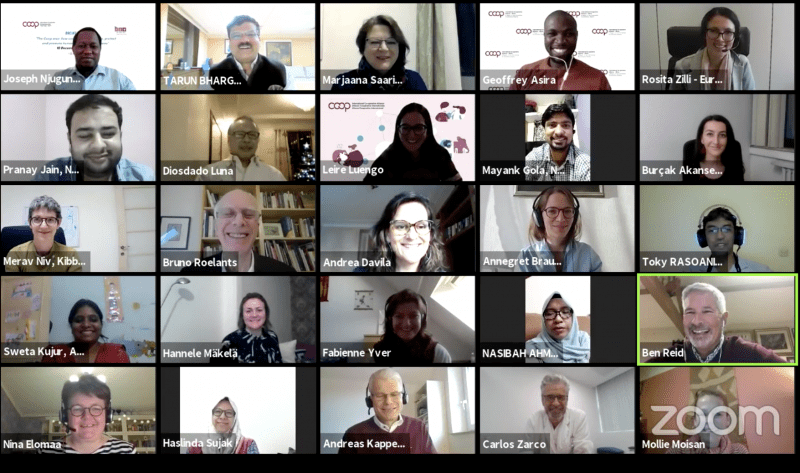
The International Cooperative Entrepreneurship Think Tank (ICETT) hosted an online conversation on human rights in value chains on 10 December to mark International Human Rights Day. The event was an opportunity to find out how cooperatives are practicing and promoting Human Rights all over the world.
Value chains and supply chains are fundamental as the world recovers from the pandemic, said ICA Director General, Bruno Roelants. The cooperative identity statement elaborated within the ICA and enshrined within the ILO Recommendation 193 on the Promotion of Cooperatives includes principles that unavoidably engage cooperatives in the issue of human rights, he added.
Tarun Bhargava, Chair of ICETT and Joint General Manager at the Indian Farmers Fertilisers Cooperative (IFFCO), said that coop-to-coop trade could play a big role in building a cooperative value chain – particularly post Covid-19. As part of its approach to human rights, IFFCO works to improve farmers’ lives and promotes co-operative development.
Nina Elomaa, Senior Vice President Sustainability at S-ryhmä / S Group in Finland, shared the key elements of her cooperative’s human rights framework, under which SOK examines labour conditions and assesses supplier performance through third party audits. In 2019 the retailer commissioned an external party to conduct an in-depth human rights assessment of its tomato supply chain in Italy. The research found elements of forced labour, poor housing conditions and excessive working hours.
As a single cooperative, there are limitations to what SOK can do to tackle the issues on its own, said Ms Elomaa. The retailer will be looking to engage in advocacy efforts for legal recruitment channels for migrant workers and will continue to listen to workers and train and monitor and collaborate with suppliers. Similar issues occur in other European countries, thus international collaboration is needed to address the issue, added Ms Elomaa.
Rosita Zilli, Deputy Secretary General at Euro Coop, highlighted other case studies of European retailers pioneering solutions, some of which were featured in a position paper on human rights in supply chains published by Euro Coop in 2018.
Back in 2017, Coop Italy launched its Good and Fair campaign to foster ethics in food supply chains considered at risk. As part of this, it asked suppliers to commit to conducting checks on their associates. Through another programme, Coop Origine, the retailer allows consumers to verify the origin and main ingredients of each product. Coop Italia also runs its own-branded Fairtrade line.
In the UK, the Co-op Group has adopted a similar approach through its Ethical Trade and Human Rights Policy, Sound Sourcing Code of Conduct, Sustainable Procurement and Supplier Policy and Human Rights and Trade Policy. The Group has also been actively campaigning against modern slavery and is providing paid work placements for victims of modern slavery.
Likewise, Coop Norway, a founding Member of the Ethical Trading Initiative, has developed a Code of Conduct through Coop Trading that requires third party audits for suppliers in risk countries.
While these achievements put cooperatives at the forefront of tackling abuses, more could be done, argued Ms Zilli. “It is possible to build on what is already there,” she added.
Annegret Brauss, Associate Programme Officer at the International Trade Center, explained how – by promoting greater inclusivity and sustainability – cooperatives could: increase volumes and improve quality; make their supply chains sustainable in the long-term; improve worker retention and productivity; strengthen governance through diverse leadership; and boost their reputation and market opportunities. Read our in-depth interview with the ITC experts here.
Fabienne Yver, Project Coordinator – Fair trade Advocacy Office (FTAO), looked at human rights in value chains from the perspective of fair trade producer cooperatives. A report commissioned by the FAO found that small farmer cooperatives need adequate resources and conditions to comply with human rights due diligence (HRDD).
Yet, while sustainability schemes such as Fairtrade can offer support for HRDD work by companies, workers and small farmer cooperatives, they cannot exempt enterprises from their HRDD responsibilities, warned Ms Yver.
Andrea Davila, Technical Officer, Cooperatives Unit Enterprises Department of the International Labour Organization (ILO), said human rights were part of the DNA of cooperatives. She praised the sector for its work tackling child labour and forced labour, investing in local communities and formalising the informal economy.
“We have seen that cooperatives are strategic and key actors when engaging in social dialogue,” she said, adding that cooperatives empower their members through equal voting rights on the basis of one member, one vote.
Next year has been declared the International Year for the Elimination of Child Labour by the UN - and cooperatives will be a key actor in raising awareness, she added.
“Human rights in value chains are linked with gender-based violence in the workplace. Human rights are also linked to cooperative principles, which gives us a strong starting point,” concluded ICA board member Marjaana Saarikoski.
(Re)Watch the full session and download the presentations:




